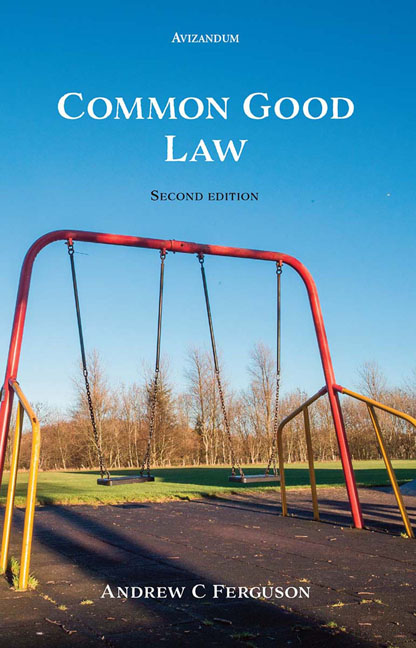Book contents
- Frontmatter
- Contents
- Preface
- Tables of Legislation
- Table of Cases
- 1 Origins and Definitions
- 2 Statutory Framework
- 3 The Administration of the Common Good
- 4 Inalienable Common Good Property
- 5 Classification of Common Good Land
- 6 Appropriation, Alienation and Disposal of Common Good Land
- 7 When Does ‘a Question’ Arise?
- 8 Factors Involved in Allowing Disposal
- 9 Taking a Common Good Case to Court
- 10 Common Good and Community Empowerment
- Appendix I List of Burghs
- Appendix II Disposal, Appropriation and Alienation
- Index
2 - Statutory Framework
Published online by Cambridge University Press: 20 October 2020
- Frontmatter
- Contents
- Preface
- Tables of Legislation
- Table of Cases
- 1 Origins and Definitions
- 2 Statutory Framework
- 3 The Administration of the Common Good
- 4 Inalienable Common Good Property
- 5 Classification of Common Good Land
- 6 Appropriation, Alienation and Disposal of Common Good Land
- 7 When Does ‘a Question’ Arise?
- 8 Factors Involved in Allowing Disposal
- 9 Taking a Common Good Case to Court
- 10 Common Good and Community Empowerment
- Appendix I List of Burghs
- Appendix II Disposal, Appropriation and Alienation
- Index
Summary
Earlier statutory controls
At the close of the nineteenth century, the common good of burghs started to come under stricter statutory control. Part of the policy behind this was the disposal/alienation of land issue and, in particular, a string of cases examined in more detail shortly such as Sanderson v Lees; Grahame v Magistrates of Kirkcaldy; Paterson v Magistrates of St Andrews; Blackie v Magistrates of Edinburgh; and, in particular, the Inner House decision in Murray v Forfar Magistrates in 1893, which set out quite clear guidelines on what might, and might not, be alienated from the common good of a burgh.
Another issue, however, was the increasing desire of ratepayers to see how the finances of their burgh were being administered. Sundry bits of legislation had created something of a patchwork quilt of regulatory authorities. As well as increased professionalisation of bodies such as the police, new utilities such as gas and sewerage systems had to be installed and regulated. Public health had also become a major issue as the Victorians began to master ways of overcoming - or at least controlling - the infectious diseases that had previously caused widespread pandemics.
The Town Councils (Scotland) Act 1900 attempted to deal with all these issues. Section 8 vested all functions under the Burgh Police (Scotland) Act 1892 and those of police, gas or water commissioners in the town councils themselves. Section 9 took the consolidation process further by ensuring that a town council could sue and be sued in its corporate name and that title to all lands acquired by the town council was to be taken in its name, as well as execution of all deeds, contracts and ‘writs of importance’ being granted in the corporate name.
So far as the keeping of accounts was concerned, sections 91 to 96 required councils to submit to audit requirements under the scrutiny of the Secretary for Scotland. In particular, section 92 required the council to make out an account:
of all the monies received and expended by them on account of the common good and revenue of the burgh, and on account of any rates or assessments levied or collected, or money realised, received, or borrowed by them under the Burgh Police (Scotland) Act, 1892, or any other Act under which they are authorised to levy assessments or uplift or borrow money.
- Type
- Chapter
- Information
- Common Good Law , pp. 16 - 33Publisher: Edinburgh University PressPrint publication year: 2020



